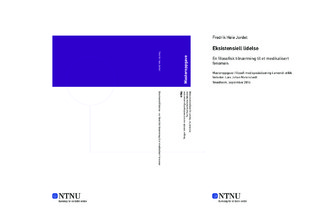| dc.description.abstract | “Existential suffering” is a widely used concept within palliative care, however this far no precise definition has been forthcoming in the literature. The goal of this thesis is both to explore the rather confusing realm of existential suffering and to clarify the philosophical content of so-called existential suffering and its conceptual ties to existentialism. In my three-part analysis I will discuss what is apparently medicalized approach to the existential suffering, then go on to present Weberian ideal models of existential suffering, and also provide an account of the existentialist content as conceptualized in existential suffering. The chapter on medicalization takes as its point of departure the conceptual affiliation to the almost exclusively religious interpretation of «spirituality» as found in textbook literature on palliative medicine; furthermore, I look at the obvious pathologization of existential issues in t erminal patients that takes place in the research literature. I shall maintain that such pathologization of existential issues results in a medicalization of the concept of existential suffering. The chapter on ideal models of existential suffering offers a non-medicalized approach that takes into account the purely human characteristics of existential suffering, and acknowledges existential suffering in terms of general existential suffering, with regard to «weariness of life», and in relation to existential suffering in cases of terminally ill patients. Subsequently, these models will be seen in the light of the most common disease trajectories decedents have undergone. In the chapter dealing with the philosophical content of existential suffering, I will explain in what way the concept of existential suffering does indeed have a content that has been explained in detail within the philosophical tradition of existentialism. My aim is to show that a medical understandin g of existential issues in end-of-life cases (i.e. existential suffering) is best performed on the basis of existentialist works that explore and define the very essence of existential suffering. This final chapter will include a tentative analysis of existential philosophy’s contribution to the concept of existential suffering, where the works of Nietzsche, Heidegger, Camus, Kierkegaard, and Sartre are employed in an attempt to clarify a convergence towards the issue of meaning and an awareness of what it is to exist as a human being. The goal of this thesis is twofold: to humanize palliative end-of-life care in clinical cases where patients suffer from existential suffering or related issues, and to contribute to the development of a conceptual instrument that will prove helpful in research. | nb_NO |

